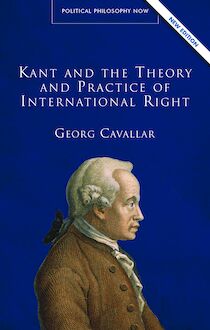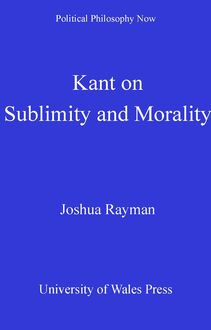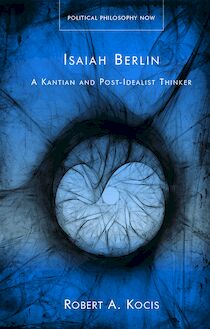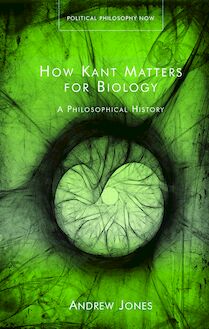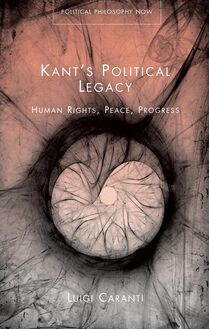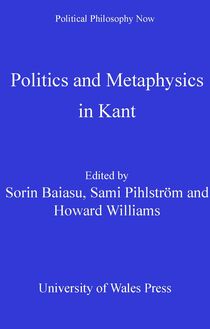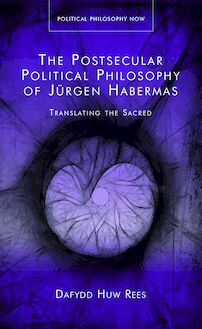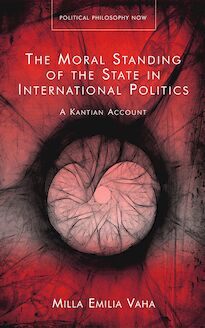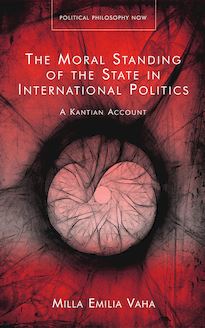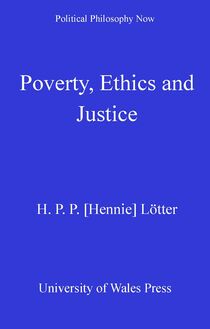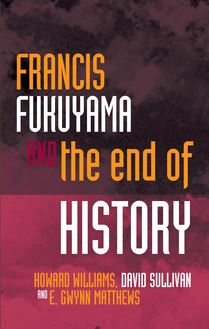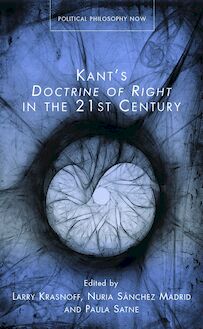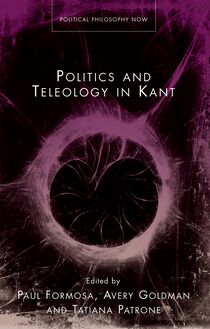-
 Univers
Univers
-
 Ebooks
Ebooks
-
 Livres audio
Livres audio
-
 Presse
Presse
-
 Podcasts
Podcasts
-
 BD
BD
-
 Documents
Documents
-
- Cours
- Révisions
- Ressources pédagogiques
- Sciences de l’éducation
- Manuels scolaires
- Langues
- Travaux de classe
- Annales de BEP
- Etudes supérieures
- Maternelle et primaire
- Fiches de lecture
- Orientation scolaire
- Méthodologie
- Corrigés de devoir
- Annales d’examens et concours
- Annales du bac
- Annales du brevet
- Rapports de stage
La lecture à portée de main
Vous pourrez modifier la taille du texte de cet ouvrage
Découvre YouScribe en t'inscrivant gratuitement
Je m'inscrisFrancis Fukuyama and the End of History , livre ebook
Découvre YouScribe en t'inscrivant gratuitement
Je m'inscrisEn savoir plus
Vous pourrez modifier la taille du texte de cet ouvrage
En savoir plus

Description
Fukuyama’s concept of the End of History has been one of the most widely debated theories of international politics since the end of the Cold War. This book discusses Fukuyama’s claim that liberal democracy alone is able to satisfy the human aspiration for freedom and dignity, and explores the way in which his thinking is part of a philosophical tradition which includes Kant, Hegel and Marx. Two new chapters in this second edition discuss the ways in which Fukuyama’s thinking has developed – they include his celebrated and controversial criticism of neoconservatism and his complex intellectual relationship to Samuel Huntington, whose Clash of Civilization thesis he rejects but whose notion of political decay is central to his more recent work. The authors here argue that Fukuyama’s continuing fundamental contributions to debates concerning the spread of democracy and threat of global terror mark him out as one of the most important thinkers of the twenty-first century.
Sujets
Informations
| Publié par | University of Wales Press |
| Date de parution | 20 juillet 2016 |
| Nombre de lectures | 1 |
| EAN13 | 9781783168781 |
| Langue | English |
Informations légales : prix de location à la page 0,1900€. Cette information est donnée uniquement à titre indicatif conformément à la législation en vigueur.
Extrait
POLITICAL PHILOSOPHY NOW
Chief Editor of the Series:
Howard Williams, Aberystwyth University, Wales
Associate Editors:
Wolfgang Kersting, University of Kiel, Germany
Steven B. Smith, Yale University, USA
Peter Nicholson, University of York, England
Renato Cristi, Wilfrid Laurier University, Waterloo, Canada
Political Philosophy Now is a series which deals with authors, topics and periods in political philosophy from the perspective of their relevance to current debates. The series presents a spread of subjects and points of view from various traditions which include European and New World debates in political philosophy.
Also in series
Nietzsche On Theognis of Megara
Renato Cristi and Oscar Velásquez
Hegel and Marx: After the Fall of Communism
David MacGregor
Politics and Teleology in Kant
Edited by Paul Formosa, Avery Goldman and Tatiana Patrone
Identity, Politics and the Novel: The Aesthetic Moment
Ian Fraser
Kant on Sublimity and Morality
Joshua Rayman
Politics and Metaphysics in Kant
Edited by Sorin Baiasu, Sami Pihlstrom and Howard Williams
Nietzsche and Napoleon: The Dionysian Conspiracy
Don Dombowsky
POLITICAL PHILOSOPHY NOW
Francis Fukuyama and the end of history
Howard Williams, David Sullivan and E. Gwynn Matthews
© Howard Williams, David Sullivan and E. Gwynn Matthews, 2016
The original text of Francis Fukuyama and the end of history was first published by the University of Wales Press in 1997
All rights reserved. No part of this book may be reproduced in any material form (including photocopying or storing it in any medium by electronic means and whether or not transiently or incidentally to some other use of this publication) without the written permission of the copyright owner except in accordance with the provisions of the Copyright, Designs and Patents Act 1988. Applications for the copyright owner’s written permission to reproduce any part of this publication should be addressed to The University of Wales Press, 10 Columbus Walk, Brigantine Place, Cardiff CF10 4UP.
www.uwp.co.uk
British Library Cataloguing-in-Publication Data
A catalogue record for this book is available from the British Library.
ISBN 978-1-78316-876-7
eISBN 978-1-78316-878-1
The rights of Howard Williams, David Sullivan and E. Gwynn Matthews to be identified as authors of this work have been asserted in accordance with sections 77, 78 and 79 of the Copyright, Designs and Patents Act 1988.
Contents
Foreword by Series Editor to the Second Edition
Preface to the Second Edition
Introduction
1 Kant: History and the Moral Imperative
2 Hegel: Spirit and State
3 Marx: Communism and the End of Prehistory
4 Fukuyama I: Reinventing Optimism
5 Fukuyama II: Recognition and Liberal Democracy
6 Fukuyama III: International Dimensions
7 Popper: A Liberal Critic of the End of History
8 Religion and the End of History
9 Rewriting Modernity: History, Progress and Identity
10 Fukuyama After the End of History
11 Philosophies of History
Notes
Bibliography
Foreword by Series Editor to the Second Edition
Chapters 10 and 11 are new to this edition and discuss Fukuyama’s work in the quarter century following the publication of The End of History and the Last Man . Readers familiar with Fukuyama’s earlier work may wish to begin with the Preface to the Second Edition and then move to chapter 10 . The remaining chapters, with some minor changes to the Introduction, remain unaltered from the first edition, for reasons that are discussed in the Preface to the Second Edition.
Each of the chapters in this book was written predominantly by one of the authors. Howard Williams provided chapters 1 , 2 and 3 on Kant, Hegel and Marx; chapters 4 , 5 and 6 on Fukuyama were composed by David Sullivan; and chapters 7 and 8 on Popper and religion and the end of history were written by Gwynn Matthews (who was responsible for first bringing the three authors together). Chapter 9 (the original Conclusion to the First Edition) was written by Howard Williams and David Sullivan. David Sullivan wrote the larger part of chapter 10 , with Gwynn Matthews contributing to the section on Huntington. Howard Williams wrote the larger part of chapter 11 , with contributions on Fukuyama from David Sullivan. Gwynn Matthews, who remains closer to Fukuyama’s original Hegelianism, dissented from the Kantian emphasis of this last chapter, an indication of the way in which Fukuyama’s work continues to give rise to fruitful debate. This is the broad picture. However, substantial sections of each chapter were provided by the other authors as well. So the whole is a collaborative enterprise. For the sake of consistency, the entire book was brought together by David Sullivan and then finally edited by Howard Williams.
Preface to the Second Edition
The invitation to prepare a new edition of Francis Fukuyama and the End of History has provided the opportunity to return to a writer and a theme which both have enormous relevance to the contemporary world. At first sight these claims – and the appearance of a second edition of this book – might seem strange as Francis Fukuyama’s paper ‘The End of History?’ and his book length development of the themes of the article in The End of History and the Last Man were both products, at least in large part, of the end of the Cold War. While understandable, such a reaction is nevertheless misguided. Part of the aim of this new edition is to show the continuing relevance of Fukuyama’s ideas and the ways in which they have been developed in his subsequent work, but we also want to return to the wider question of the end of history as it developed through the work of Kant, Hegel and Marx to discuss its significance in the very changed political situation of the twenty-first century. To this end we have added two new chapters.
In the first edition of the book we wrote that Fukuyama was a contemporary writer whose work was still in the process of developing, and we alluded to the practical problem which arises from the fortunate fact that the author was still alive and might well produce further works of perhaps greater significance. In the intervening years the truth of these words has been borne out as Fukuyama has produced a large and impressive body of work subsequent to The End of History and the Last Man . Our first new chapter, chapter 10 , discusses a number of themes which have developed in Fukuyama’s work over the past quarter century. These include Fukuyama’s response to neo-conservatism; his nuanced and sophisticated dialogue with Samuel Huntington over issues including, but by no means restricted to, the debate over the clash of civilizations; and Fukuyama’s major contribution to the debate over democratic transition, especially in the light of the so-called Arab Spring.
All of these themes are related to the end of history thesis, but we argue that it would be a serious misunderstanding to assume that Fukuyama had one big idea which he first introduced in ‘The End of History?’ and which he has been merely re-tweaking ever since. The idea of the end of history remains important but in his later work it forms part of a larger picture which, we argue, has much to commend it and which should be seen as Fukuyama’s rounded and mature contribution to scholarship.
Having defended Fukuyama, we do not deny that there are some issues in his work which are problematic. To address these problems, and one in particular, the second new chapter, chapter 11 , returns to a topic, the philosophy of history, which was central to ‘The End of History?’ and The End of History and the Last Man , but which has been largely absent from Fukuyama’s later work. We argue that the re-introduction of a philosophy of history would help to resolve some tensions in his thinking and writing, and we sketch out how some aspects of Kant’s philosophy of history which Fukuyama draws on in The End of History and the Last Man might usefully be employed by him again. In returning to this discussion, we also seek to show the relevance of the earlier contributors to the debate, especially Kant, and we suggest one the way in which a Kantian philosophy of history would bring particular insights to more recent analyses of contemporary world affairs, including that offered by Fukuyama.
The text of our original chapters remains unchanged because we believe they still provide an accurate and useful guide to Fukuyama’s account of the end of history and of the tradition from which it emerged. We argued in the first edition, both repeating and anticipating a criticism which Fukuyama himself has expressed with considerable exasperation over the years, that many of his critics have seriously misunderstood and oversimplified his original arguments. These misunderstandings have been amplified and repeated by the often far too cursory discussions of the end of history in introductory and undergraduate texts, which have served only to reinforce a simplistic view of his ideas. We hope that by updating the book with a discussion of Fukuyama’s more recent writings while retaining our original detailed account of the end of history as we – and Fukuyama – understood it at the time, we will provide a balanced overview of his work. Hopefully, this will help provide an antidote to those critics who, having misunderstood the original thesis, either ignore his later work or read it in the light of their misunderstanding. We also hope that it may encourage a more general recognition of the breadth and depth of his contribution to modern political thought.
Introduction
Does history have a meaning? At the close of a century which has known the most appalling suffering and misery, the answers to that question are far from clear. To many people the very existence of the Holocaust and the other lesser but still horrific evils of the century – a list which runs from the senseless slaughter of the First World
-
 Univers
Univers
-
 Ebooks
Ebooks
-
 Livres audio
Livres audio
-
 Presse
Presse
-
 Podcasts
Podcasts
-
 BD
BD
-
 Documents
Documents
-
Jeunesse
-
Littérature
-
Ressources professionnelles
-
Santé et bien-être
-
Savoirs
-
Education
-
Loisirs et hobbies
-
Art, musique et cinéma
-
Actualité et débat de société
-
Jeunesse
-
Littérature
-
Ressources professionnelles
-
Santé et bien-être
-
Savoirs
-
Education
-
Loisirs et hobbies
-
Art, musique et cinéma
-
Actualité et débat de société
-
Actualités
-
Lifestyle
-
Presse jeunesse
-
Presse professionnelle
-
Pratique
-
Presse sportive
-
Presse internationale
-
Culture & Médias
-
Action et Aventures
-
Science-fiction et Fantasy
-
Société
-
Jeunesse
-
Littérature
-
Ressources professionnelles
-
Santé et bien-être
-
Savoirs
-
Education
-
Loisirs et hobbies
-
Art, musique et cinéma
-
Actualité et débat de société
- Cours
- Révisions
- Ressources pédagogiques
- Sciences de l’éducation
- Manuels scolaires
- Langues
- Travaux de classe
- Annales de BEP
- Etudes supérieures
- Maternelle et primaire
- Fiches de lecture
- Orientation scolaire
- Méthodologie
- Corrigés de devoir
- Annales d’examens et concours
- Annales du bac
- Annales du brevet
- Rapports de stage
